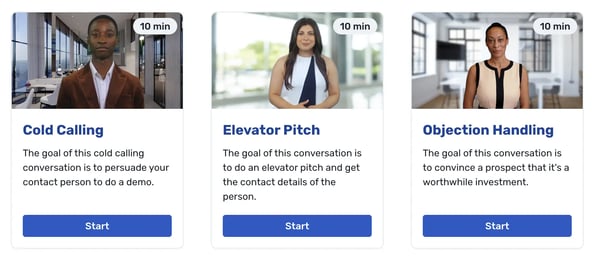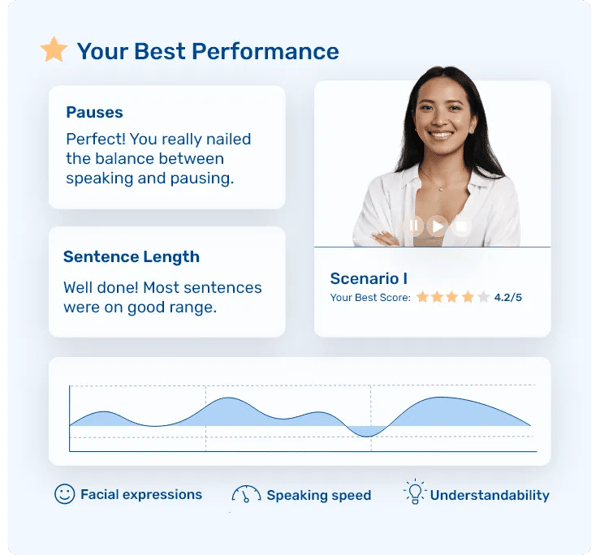In today's customer-centric business environment, where the "if we build it, customers will come" mentality doesn't stand to suffice anymore, only the sales reps that can clearly communicate value and connect with potential customers and prospects on a personal level will see success.
And doing that in a small window of time, namely in a sales pitch, is a tough skill to master, even for the most experienced sales reps.
But here's the reality:
-
57% of business buyers say sales reps often lack adequate knowledge of their businesses.
-
63% of business buyers say most sales interactions focus on products rather than solutions.
-
73% of business buyers say most sales interactions feel transactional.
So as the economic downturn tightens customer budgets, these trusted sales rep-to-customer relationships are all the more critical when you want to see your sales team deliver pitches that hook prospects, sell products, and generate leads.
In this blog, we cover just how you can make sure your sales reps are pitch ready at all times, and how you can train your teams to deliver pitches that will have prospects wanting more.
What's in this post:
What is a sales pitch?
By official definition: A sales pitch is a minutes-long script or a concise statement where a salesperson persuades a prospect whether or not to buy a product/service.
It is essentially a curated script that a sales rep presents to a prospect, with the hope of convincing them to invest in their product or service, by giving a background on how the product or service would provide the prospect with value/help them solve a challenge.
Pitches can take different shapes and forms, from just a speech to PowerPoint presentations showing facts and figures to add to the argument or simply talking.
| Types of sales pitches | What do they entail? |
| Cold sales pitch | A common pitching style, where the prospect has never heard about the organization before. |
| Follow-up sales pitch | A friendly call, often after an initial call or a product demo to remind the prospect about the value. |
| Warm sales pitch | When the prospect has already shown some sort of interest in the organization - personalization becomes especially critical. |
| Cross-sell/up-sell pitch | A pitch that hopes to sell a customer a secondary product/service to what they already have. |
| Subject line sales pitch | A pitch through an email where an organization want to attract a prospect through a subject line. |
No matter how a sales rep conducts a pitch, and what tool they use, the goal is the same: leave a lasting impression on the prospect and leave them interested in the product or solution you're selling - all in two minutes or less.
What is an elevator pitch?
Both an elevator pitch and a sales pitch have the underlying aim of communicating information and persuading a prospect, however, depending on the context of a situation, a sales rep may use either a sales pitch or an elevator pitch to connect with a prospect.
Compared to a sales pitch, an elevator pitch is much more concise, usually only lasting from half a minute to two minutes - the amount of time one typically stands in an elevator for. Like a sales pitch, a successful elevator pitch introduces a prospect to the product and service and piques their interest in the offer.
Therefore, elevator pitches are usually delivered when sales reps only have a very short window of time to grab a prospect or audience's attention, i.e. in a conference, or a networking event.
What is sales pitch training?
Speaking the language of sales is never easy, let alone curating the perfect sales pitch. In fact, it hardly ever comes naturally to most. And to add fuel to the flame, depending on the industry, product, or service you're offering, or the target audience you're speaking to, the language and vocabulary of the sales pitches will also differ. A sales rep perfecting their pitch to sell software in a B2B firm will require a much different approach to a sales rep selling a car to a consumer.
But here is the cold, hard fact: curating the vital ability to perfect a sales pitch is, despite the difficulties, an indispensable skill in a sales rep's toolkit.
When a sales rep perfects their sales pitch, prospects become more engaged, the trust and emotional connection between the sales rep and potential customer are built, the sales cycle time decrease, and conversion rates increase.
Basically, the ability to execute an effective sales pitch determines whether a sales rep has the magic ingredient of a good pitch that convinces prospects to take the next step, or not.
But as previously mentioned, the perfect sales language isn't often something that comes naturally, even for the best sales reps. That's where sales pitch training comes in. The more time that sales reps get to practice curating and delivering a sales pitch, the better and more comfortable they will become when they speak to real prospects, and the higher the chances the conversation will lead to sales and revenue.
When do sales reps need to do a sales pitch?
So, when do sales reps actually need to do a sales pitch? A sales pitch is useful for reps when they are solution selling, i.e. when sales reps truly understand a customer's problems and bring smart solutions for these people.
According to Salesforce, solution selling is making your products work for the customer, not convincing them to change how they do things based on a feature list.
In order to do this, a sales pitch that focuses on identifying the prospect's problems or pain points, and guiding them to a solution that solves the said issue. In fact, 66% of business buyers “expect sales reps to pitch solutions rather than simply pitch products”.
Top tips to master a sales pitch
Now we know what a sales pitch is, and when they are used. But what exactly makes up a good sales pitch? How can you make sure your sales teams are mastering the art of sales pitching?
1. Clearly identify what the customer's needs/pain points are.
Today, business is all about customer-centricity.
In other words, value selling is the only way to hook prospects' attention, carefully understanding their needs, and pains, and understanding how to provide them with value is one of the foundational elements that successful salespeople focus on.
66% of customers “expect companies to understand their unique needs and expectations”
The best sales pitches emerge as a new way for sales teams to relate to customers and forge long-standing connections. In B2B customer relationships, trust is built when sales reps offer tailored solutions based on a demonstrated understanding of a business's unique challenges and goals.
This starts with, firstly, understanding who you will be talking to. Building a rapport with the details of your prospect will not only build your confidence as you'll know what questions to be asking, but also aid you in developing a personal relationship with ease.
“It’s important to understand who it is that you are trying to sell to from a personal level—not just their title and the company they work for,”
- Jack Scarr, Sales Manager at Netmums.
Want to learn more about how you can make sure your sales teams are trained to value-sell like experts? Check out our detailed article on value-selling training here.
2. Cut the jargon - clarity wins.
Even the best sales leaders will struggle to tone down the technical language, especially as they are experts in their field.
But building a connection with prospects in a brief sales pitch requires clear, concise delivery of information that doesn't leave prospects feeling confused.
If jargon is absolutely necessary to convey your pitch (since it can also demonstrate that you are an industry expert), define the meaning or explain why it's important.
3. Practice the pitch to perfection, in a non-customer-facing environment.
Establishing a low-stress environment, where sales reps can freely and independently practice pitching, without any internal evaluation from sales managers, fellow reps, or customers is a critical component in order for a sales rep to build confidence in delivering effective sales pitches.
When reps have the chance to practice without exposure to fear or judgment, by recording their sales pitch delivery and reviewing it on their own, sales reps not only develop the confidence to master pitching to even the most difficult prospects, but they develop a critical skill - self-awareness.
When reps can see themselves delivering a pitch, they are ultimately put right in the customer's seat and can analyze their pitch from the customers' perspective.
How to train your sales team to deliver flawless sales pitches?
Training your sales teams to deliver flawless pitches boils down to the training prior to the pitch.
- Are you providing your sales teams with a psychologically safe environment to practice and perfect their pitch delivery and presentation skills at their own pace?
- Do your reps know what a winning presentation entails?
- Do your reps have access to their training constantly to ensure their knowledge is up-to-date?
- Does training provide them with self-reflection opportunities to put their feet in the prospects' shoes, and do they get instant, personalized feedback?
If your answer was no to any of the questions above, you may want to reconsider your sales enablement strategies.
Making sure your sales training covers these core foundational elements will be the difference between whether your reps will lead conversations that generate leads and ramp up revenue, or simply keep prospects as, just that - a prospect.
So how can you achieve this?
Luckily with the rapid pace of technological advancements that we're witnessing today, we no longer have to rely on traditional sales training resources that often limit scalability, lack trainee engagement, and aren't cost-effective.
AI-powered video training platforms make it a breeze for sales managers and sales teams to hone their sales skills, and of course, to deliver sales pitches. For example, Retorio's Behavioral Intelligence Platform allows sales reps to immerse in AI-powered training simulations where they can practice delivering pitches, and other likely scenarios they'd face on the role, all in a psychologically safe environment, free from external judgment or fear.
Reps record their pitch and responses and can look back on their performance and receive tailored feedback on what they did well, and where they should improve.
 Retorio's sales training platform allows sales reps to train in various scenarios they'd likely face in the role, such as cold calling, elevator pitching, objection handling, and many more.
Retorio's sales training platform allows sales reps to train in various scenarios they'd likely face in the role, such as cold calling, elevator pitching, objection handling, and many more. The novelty in this approach lies in the fact that the learner can not pre-select from possible answers, which is commonly found in traditional situational judgment tests (SJTs), or passive online sales training platforms.
Instead, sales reps speak freely, just like they would do when they speak with a real customer. The trainee must actively retrieve knowledge and, like in real life, react immediately. This way, learning effectiveness is increased by mimicking a natural learning style, which matches how learnings have to be applied later on.
With Retorio's training, the learning doesn't end there. Once modules are completed, trainees received on-demand, immediate tailored feedback from the AI platform. This essentially creates an environment where sales reps get a strong sense of presence and immersion, minus the judgment and minus the external influences.
As Retorio only puts objective and transparent, scientifically sound research into practice, trainees receive fact-based, trustworthy feedback. This allowed them to train anonymously and comfortably, whilst still receiving tailored feedback backed by behavioral analytics AI.

So, want to see how AI-powered role-play training simulations could take your sales teams to the next level, and see them deliver pitches and lead even the most difficult client conversations with ease?
Keep your sales rep's conversation ready at all times! Test our AI training platform today, and see the impact tomorrow.
Pitch training sales reps are the sales reps that will
generate leads, close deals and boost revenue - because let's be honest, most sales reps
aren't born with the ability to deliver a perfect
pitch without training.
Thanks to advanced Al technologies, Al can be applied to enhance sales training and thus
improve pitch training. Al sales training platforms are a clear example of how Al can be applied to
improve pitch delivery for a sales team.
Reps can engage with Al-powered video role-plays of typical sales scenarios (i.e. pitch delivery)
and practice in a psychologically safe environment. A huge part of effective performance
management lies in measuring training effectiveness and providing trainees with instant,
personalized feedback on their training performance. Unlike other remote learning platforms that typically measure variables such as the number of modules completed, or access times, Al- powered training platforms provide an objective, systematic method for behavioral data capture. This gives the trainee valuable insight into their soft skill performance.
The innovative aspect of this approach lies in its departure from traditional Situational Judgment
Tests (SJTs), where learners are typically provided with pre-selected answer options. Instead,
learners are encouraged to engage in free speech, actively retrieving knowledge and responding
in real-time, mirroring real-life situations. Upon completion of the modules, such as cold calling
or elevator pitching, trainees receive immediate, on-demand feedback tailored to their individual
performance. This created an immersive learning environment where trainees received feedback
on performance, free from judgment and external influences.
Retorio's Behavioral Intelligence Platform simulates different sales rep-to-customer/prospect
interactions with various inquiries, providing an opportunity for the cohort to practice realistic
scenarios they'd likely face in the role. Once the Al understands and interprets the behavior from
the video data, it provides trainees with personalized feedback on performance and analyzes to which extent the trainee's responses match the goals of the organization. Additionally, the Al gives feedback on how the trainees communicate their responses, from facial expressions, body language, tone of voice to language.
By learning from top performers and using behavioral insights, Retorio's Al provides insightful
feedback to sales teams wanting to perfect sales pitches, shape their behavior, and improve their
communication, which they could directly implement into their next pitch.





